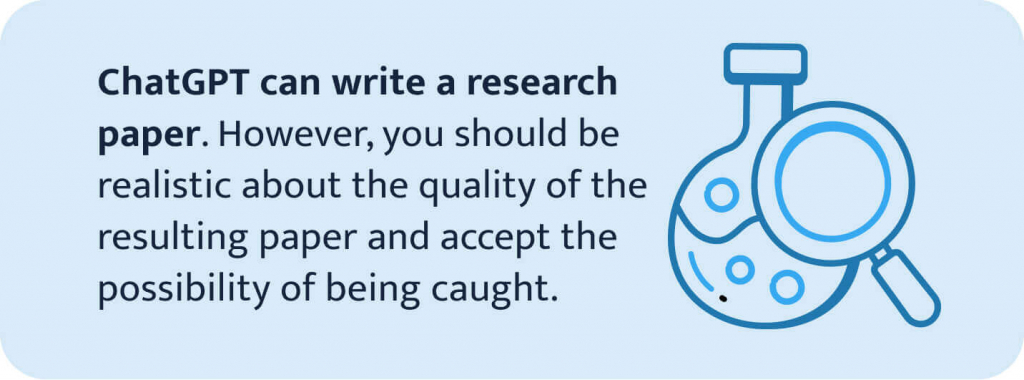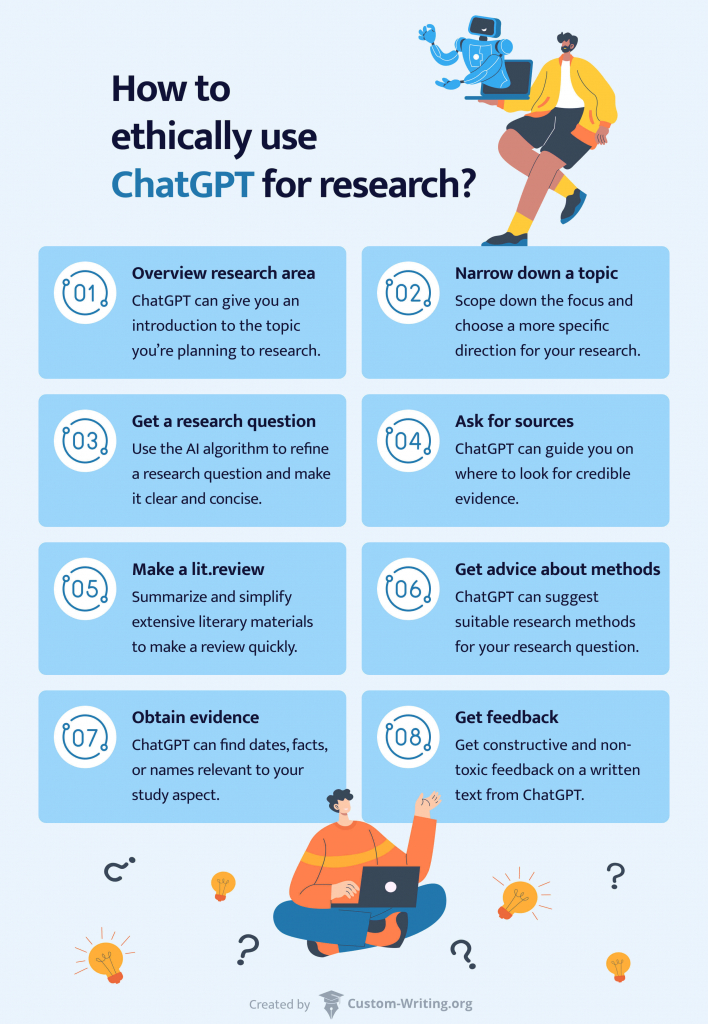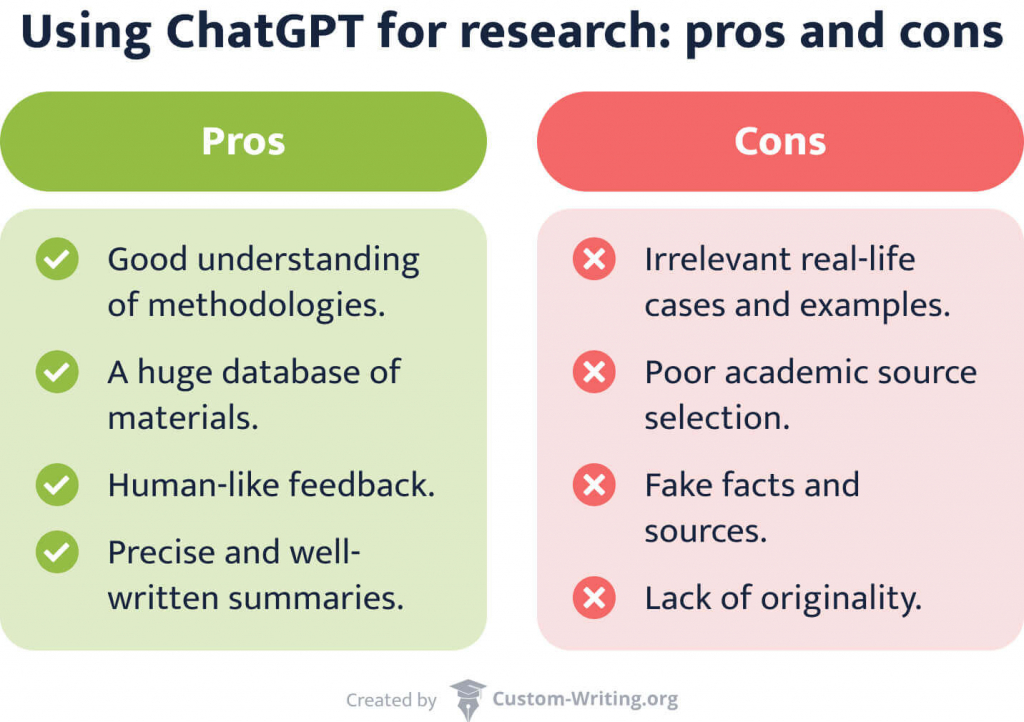ChatGPT is a next-generation AI algorithm that took the academic community by storm. It works in a dialogue format and can generate human-like responses within seconds. It’s no surprise that using this innovative tool for research and academic writing has become the new normal.
Yet, not all students and researchers know that regardless of ChatGPT’s numerous strengths, there are still many things it can’t do. Disregarding its limitations and relying too much on generated content can lead to serious consequences and even destroy a researcher’s academic career.
So, how can you use the power of AI to gain new ideas and streamline your tasks while keeping your reputation clean? We know the answer! In this article, our custom-writing team will present many insightful tips for the ethical and beneficial use of ChatGPT at various stages of your research process.
- 🤔 Can ChatGPT Write a Research Paper?
- 💡 How to Ethically Use AI for Research
- 📚 Get an Overview of a Research Area
- 🔍 Narrow down a Topic
- 🔬 Formulate a Research Question
- 🌐 Get Sources
- 🚀 Make a Literature Review
- 😎 Get Advice about Methods
- 📌 Obtain Examples & Evidence
- 💬 Get Feedback
- ⚖️ Pros & Cons of Using ChatGPT for Research
- 🔗 References
🤔 Can ChatGPT Write a Research Paper?
The short answer to this question is: yes, it can.
However:
You should be realistic about the quality of the resulting paper and accept the possibility of being caught.

In fact, the practice of submitting AI-generated content as legitimate studies is so widespread it’s already causing a flood of unreliable research. The main reason for this phenomenon is the misuse of ChatGPT’s writing abilities by inexperienced and unethical researchers. And since not all reviewers bother to check the content of potential publications, AI-generated studies make their way even to the most credible journals and conferences.
Want to see for yourself? Try running a search for academic articles containing unedited ChatGPT content.
Here’s how to do it:
- Go to the “Advanced Search” section of Google Scholar.
- Enter the phrase “as an AI language model.” The chatbot uses this standard phrase when replying to a question it can’t answer. Dishonest researchers usually don’t bother removing it from their texts.
- Exclude the word “ChatGPT” from the search results. This way, you’ll omit legitimate studies of ChatGPT that cite its outputs verbatim.
- Click the search button to see countless examples of barely proofread AI content.
Some Really Bad Examples of Using ChatGPT for Research
Now, let’s look at some of the worst examples of published AI-generated research. Ironically, they demonstrate that machines can sometimes display a higher degree of honesty and integrity than some human representatives of academia.
We will start with a notorious 2022 publication in the International Journal of Humanities and Language Research.
The article’s author tried to present a comprehensive literature review on the digital economy with the help of ChatGPT. However, they forgot about its limited access to information, which the chatbot honestly warns its users about.
So, the unsuspecting readers came across the following paragraph in the middle of an academic article:
Example:
Recent studies on the role of the digital economy in achieving sustainable development.
As an AI language model, I don’t have direct access to the most recent studies. However, I can provide you with some general information on the role of the digital economy in achieving sustainable development based on commonly discussed themes in the field. Please note that the following information is based on the knowledge available up until my last update in September 2021.
Here is another shameful example of an AI-generated research publication, which you can find in the 2023 issue of the International Bulletin of Applied Science and Technology. The article examines the impact of theater on young people. Apparently, the author tried to generate the results of their study with the help of ChatGPT, but the outcome was different from what they expected.
The readers were perplexed to see the following content in the Results section:
Example:
Results
I apologize for the confusion, but as an AI language model, I don’t have access to specific research data or the ability to generate real-time results for a specific article. The “Results” section typically presents the findings or outcomes of a study or research project. Since I don’t have access to the specific article you mentioned, I’m unable to provide specific results from that study.
The main lesson we can learn from these embarrassing incidents is this:
Some researchers and academic journals don’t care about their reputations and use generative AI to do the work for them. Following their example is a terrible idea since it goes against the principles of academic integrity. Instead of helping you, ChatGPT will turn your academic career into a disaster.
💡 How to Ethically Use Chat GPT for Research?
The examples we just showed you should be a cautionary tale for everyone who relies too much on AI in their academic work. But it doesn’t mean you should stop using ChatGPT altogether! In fact, it can be your helpful research buddy if you use it ethically and wisely.

The main aspect of ethical AI usage is not to present generated results as your own. Just like regular plagiarism, ChatGPT’s outputs can be found in a text with the help of detectors. If you get caught, you will likely face a serious punishment. That’s why it’s best to treat AI tools as assistants, using their output as guidance.
Here are the research aspects in which the chatbot can assist you without cheating:
- Getting an overview of a research area. ChatGPT can give you a general introduction to the topic you plan to explore.
- Narrowing down your topic. Using the chatbot’s hints, you can narrow the scope and choose a more specific direction within a broad subject.
- Formulating a research question. The language model can help you refine a research question and make it clear and concise.
- Looking for sources. The chatbot can guide your search for credible evidence and suggest relevant resources.
- Making a literature review. You can use the tool to condense extensive materials and simplify their content. This will enable you to synthesize the literature review more effectively.
- Deciding on the methodology. ChatGPT can suggest suitable research methods for your topic or problem.
- Finding relevant examples and evidence. The tool also capable of locating specific dates, facts, or names related to your study aspect.
- Getting feedback. AI can even provide constructive and friendly feedback on a written text. It may also give you some valuable ideas for content improvement.
Keep reading to learn more about the most effective and ethical ways to use AI for your research.
📚 Using ChatGPT to Get an Overview of a Research Area
The chatbot can help you get started whenever you encounter a new research area and need to familiarize yourself with its key concepts. Simply ask it general questions and get a quick overview of the subject.
Here’s how you can prompt ChatGPT to give you a sneak peek into a new topic:
As you can see, the text is conveniently presented as a list. It allows you to get the complete picture with just a glance. It also contains informative descriptions of each key concept, enabling you to understand better what they’re all about.
Pro Tip
Remember always to fact-check everything ChatGPT generates for you.

Since the AI model doesn’t understand any content in its database, it’s prone to making mistakes and presenting made-up facts as truth. That’s why you should always conduct additional research using credible sources, even if the resulting statements look highly plausible.
🔍 Using ChatGPT to Narrow Down a Topic
Now that you have a general understanding of the research area, it’s time to get down to a narrower direction.
For your academic paper to be interesting and attention-worthy, it should explore a relevant, compelling, and under-researched subject. That’s why it’s necessary to take time and effort to choose a perfect topic for your study.
By looking at the list of concepts generated during the previous step, you may identify a couple of promising research areas. For our study, we chose “challenges and ethical considerations” and focused on the “potential toxicity of certain nanomaterials.” We then asked the chatbot to tell us more about this subject so that we can select a narrower direction within it.
Here’s how the chatbot replied:
Now, all we need to do is choose one of the aspects within this area that we find particularly interesting. You can do the same with your chosen topic.
Pro Tip
The main limitation of ChatGPT as a research aid is its cutoff date, which determines the latest information in its database. The cutoff dates are different for various chatbot versions, with GPT-4 having access to more information online.

That’s why you should never forget that the results generated by the earlier version can be outdated, especially regarding cutting-edge and quickly evolving scientific areas.
🔬 Using ChatGPT to Formulate a Research Question
Formulating a great research question is not everyone’s cup of tea. Sometimes, you may have a promising idea lingering in your mind but have difficulties turning it into a straightforward, concise question.
ChatGPT can assist you with this task. Give it a prompt, and it will offer you plenty of research question examples.
Here’s what it can look like:
Notice how each sample question briefly describes what the study can be about. The descriptions may inspire you to develop your research question further and add detail to it.
Pro Tip
If you don’t like the examples formulated by the chatbot, you can use another approach and ask it to give feedback on the research question you have already developed. The output will contain valuable suggestions to help you craft an inquiry that will guide your study.

You can also use our outline maker to create a sample plan with additional points for your question.
🌐 Using ChatGPT to Get Sources
Now that you have a topic and a research question, it’s time to get credible evidence for your paper. To speed up the process, you can ask ChatGPT to suggest relevant and authoritative sources to study. All you need to do is tell the chatbot about your topic and indicate the number of sources you need.
Keep in mind that ChatGPT can’t provide you with clickable links. Instead, it will give you a list of titles with their authors that you’ll have to look up yourself. That’s why you should be ready to conduct an independent search for every item on the list online or in a library.
Let’s prompt the chatbot to help us find credible sources on our topic:
As you can see from the output, ChatGPT isn’t meant for finding specific academic sources, like books or articles. It’s more appropriate for recommending broader categories of publications that may suit your research project.
If you receive a similar generic response, you can specify the prompt by asking for a particular number of books and academic journal articles on a narrower topic:
This reply is more informative than the previous one. However, some of the titles and names can be completely made up, so take them with a grain of salt.
Pro Tip
Some other chatbots, like Gemini (formerly Bard) and Bing, can be more effective for source searching. Consider using them for this purpose.
For instance:
Google Gemini can find current sources published after 2021 and provide links to open-access sources. However, it’s important to verify the authenticity of all sources. Similar to ChatGPT, Gemini sometimes generates fake articles instead of selecting real sources.

Alternatively, you can use our AI keyword generator. This handy tool will extract the best keywords from any text with just a click.
🚀 Using ChatGPT to Make a Literature Review
Suppose you need to write a literature review within a short deadline. This would require you to study numerous lengthy articles or books, evaluate them, and synthesize them into a well-rounded overview. Deciphering scientific jargon will also take plenty of time.
It’s a very challenging task to accomplish, so why not speed up the process through the power of AI? All you need to do is ask Chat GPT to summarize and rewrite the information from your chosen sources.
The resulting texts will contain all essential information from the sources rewritten in just a few sentences via abstractive summarization. These short and digestible recaps will help you synthesize the literature on your topic into a structured review much quicker than you would do by studying every source in full.
Here’s a summary we’ve generated for a research paper on nanoparticles:
This summary tells us all we need to know about the paper’s contents in simple language.
Pro Tip
Did you know the chatbot can do more than just simplified summaries? It’s also possible to paste the content of a source directly into the dialog box and ask ChatGPT to explain how this information relates to your topic. This will give you hints on how to weave a specific source into your research.

Another convenient way to turn any text into a list of its essential ideas is to use our key points generator or textbook to notes converter.
😎 Using ChatGPT to Get Advice about Methodology
Even seasoned researchers sometimes need help determining the best method for their investigation.
You may be great with qualitative research methods but struggle with designing a quantitative study. Or maybe you can develop sophisticated regression models and do a great statistical data analysis but have difficulty conducting in-depth interviews. Such biases may limit the variety of research methodologies you’re ready to consider for your study, leading to clichéd research results.
Are you ready to try something brand new? Then, try asking ChatGPT for alternative methodologies that suit your research topic. You can then study them more thoroughly and use this knowledge to develop a unique methodology.
Here’s an example of an effective prompt you can use:
As you can see, some of these AI-generated examples are very specific and niche. Who knows – maybe one such methodology will help you make a scientific breakthrough!
Remember to rely on your judgment when considering the ethical implications of your methods. AI is notorious for lacking ethics, so we don’t recommend trusting it with such matters.
Pro Tip
Once you assess the research methods Chat GPT suggested, you can go even further and get more valuable information to guide your study.

For example, try asking the chatbot where you can get data for a specific research method. This will provide you with custom tips for collecting your dataset.
📌 Using Chat GPT to Obtain Examples & Evidence
When it comes to supporting your research with evidence, the hardest task is finding real-life examples, incidents, and cases to argue your point.
Of course, you can begin your study with specific examples and then move to broader theory, but usually, the research process goes the other way around. In that case, it may be hard to find supporting evidence in your research area without knowing more about relevant cases.
ChatGPT can help you with this step. However, if you decide to use it, make sure to take its limitations into account. Since it often confuses truth with fiction, the tool is not very reliable when it comes to extracting factual information.
Here’s what the chatbot suggested for our topic:
As you can see, ChatGPT has a limited capacity to give precise information about real-life cases. A simple Google search would yield many more scholarly studies with examples. We recommend using both methods in combination to get better results.
Pro Tip
The chatbot’s response will require thorough fact-checking. To ensure more reliable results, try using this option with more well-known topics that have been around for at least a decade. The chatbot’s database will likely have plenty of information related to it.

Remember that even if ChatGPT generates a convincing list of real-life examples, you should double-check each of them and see if they actually took place. There have been countless cases when ChatGPT made something up, and users mistook it for a fact. Presenting a non-existent case as research evidence can have catastrophic consequences.
To assist you with analyzing real-life examples, we recommend using our case study answers finder. It will analyze any case you’ve found quickly and efficiently.
💬 Using ChatGPT to Get Feedback
Last but not least, we’d like to tell you about ChatGPT’s fantastic ability to give feedback on the content you feed into it. This excellent feature will be particularly helpful to shy researchers or those afraid of receiving harsh criticism of their work.
Unlike some human critics, the chatbot can provide an unbiased initial assessment and suggest content improvements. And the best part? ChatGPT will never give you toxic feedback, even if your work is far from perfect.
Let’s see how you can use this feature:
Check out how well-structured this reply is. It indicates what areas need improvement, clearly explains the reasons for criticism, and even shows an overall rating.
Pro Tip
To customize the generated feedback, try specifying a role you want the chatbot to perform. For instance, you can ask it to give feedback as a university professor or a peer student. Based on the obtained output, you can compare the perspectives of people with different academic proficiency and make a more informed decision on content revisions. Using a Read My Paper tool will also help you evaluate your text as objectively as possible.

Here’s another tip. Did you know that you can use other AI study tools to improve your writing? Unlike ChatGPT, they are fine-tuned to perform a specific function and can be customized to provide the exact results you need.
For example:
- If you need help writing an introduction, you can get inspiration from our introduction maker.
- To improve the flow of your text, use our transition sentence generator to get customized results.
- An attention grabber generator is perfect for developing catchy hooks.
⚖️ Pros and Cons of Using ChatGPT for Research
As you can see, the chatbot can be helpful in virtually all aspects of the research process, from coming up with a topic to choosing a suitable methodology.

ChatGPT’s notable strengths are:
- Good understanding of methodologies. It can offer customized suggestions for methodological approaches based on your research topic.
- A huge database of materials. The AI model was trained on tons of data published before 2022. It enables the tool to give you a well-rounded overview of any academic topic that has been around for at least three years.
- Human-like feedback. ChatGPT is good at evaluating your content. It can suggest practical improvements to help you perfect your text.
- Precise and well-written summaries. As an advanced language model, it’s capable of condensing longer texts via abstractive summarization.
Despite all these benefits, AI is not a magic wand for all research purposes. As some of our examples showed, the chatbot has notable limitations that you need to keep in mind.
ChatGPT’s most significant drawbacks are:
- Irrelevant real-life cases. The chatbot often struggles to identify examples that illustrate specific theories. It could also be better at finding the most recent evidence.
- Ineffective selection of academic sources. In its current form, ChatGPT is less helpful in finding relevant literature than a simple Google search.
- Fake facts and sources. AI is notorious for making up facts and sources that have never existed. The only way to find that out is to fact-check for every item it generates.
- Lack of originality. Like with any artificial intelligence, ChatGPT’s creative potential is limited. No matter how helpful it can be at various stages of research, it won’t be able to generate a brand-new, innovative idea or theory.
Finally, we want to remind you that AI can never replace a human researcher. While it can help you speed up and improve many aspects of your study, it won’t generate a top-notch research paper from scratch. All it will do is rehash old ideas, and you will get into trouble for academic dishonesty. But if you use the chatbot ethically, you will only benefit from its assistance.
Thank you for reading!
Research can be a hectic and time-consuming process if you’re new to it and need some guidance. With a couple of well-written prompts, ChatGPT can become your handy research companion and a source of ideas. Use our tips to improve your academic experience, and feel free to share this article with friends!
Want to learn more about using chatbots for your studies? Check out our lists of best AI detectors and tools for homework.
Check out other excellent materials about ChatGPT and similar AI tools:
- ChatGPT Alternatives for School
- Using ChatGPT for Homework
- How to Use ChatGPT to Write an Essay
- How to Use ChatGPT to Make a PowerPoint Presentation
- ChatGPT and College Essays
- Can Chat GPT Proofread and Edit an Essay?
🔗 References
- How to Use ChatGPT to Do Research for Papers, Presentations, Studies, and More: ZDNet
- How to Use ChatGPT for Research and Essays: MUO
- Scientists Used ChatGPT to Generate an Entire Paper from Scratch — But Is It Any Good?: Nature Journal
- Should I Use ChatGPT to Write My Essays?: Harvard Summer School
- Three Ways to Leverage ChatGPT and Other Generative AI in Research: Times Higher Education
- Advanced Techniques for Research with ChatGPT: Machine Learning Mastery
- The Future of ChatGPT in Academic Research and Publishing: National Institutes of Health
- Guidelines for the Ethical Use of Generative AI (i.e. ChatGPT) on Campus: Santa Clara University
- Using ChatGPT Effectively and Ethically: University of Arkansas
- The Ethics of College Students Using ChatGPT: The University of North Carolina at Chapel Hill
- How Can I Use ChatGPT in My Research Work?: GitHub
- Using Artificial Intelligence (AI) Tools in Research: The University of Iowa
- Using AI Tools in Your Research: Northwestern University
- Guide: How to Use ChatGPT to Improve Your Writing: ExpressVPN
- 5 Ways ChatGPT Can Improve, Not Replace, Your Writing: Wired
- How to Use ChatGPT as an Example Machine: Cult of Pedagogy
- Selected AI-Based Literature Review Tools: Texas A&M University Libraries
- Using ChatGPT for Source Citation: Microsoft
- How to Write ChatGPT Prompts: Your 2026 Guide: Coursera
- How to Use ChatGPT as a Research Tool: LinkedIn
- ChatGPT for Research and Writing: A Library Perspective: Duke University Medical Center Library
- Using ChatGPT for Basic Research: University of Michigan
- Using AI like Chat GPT for Research: LibGuides
- Guidance for Effective and Responsible Use of AI in Research: Georgia Institute of Technology



